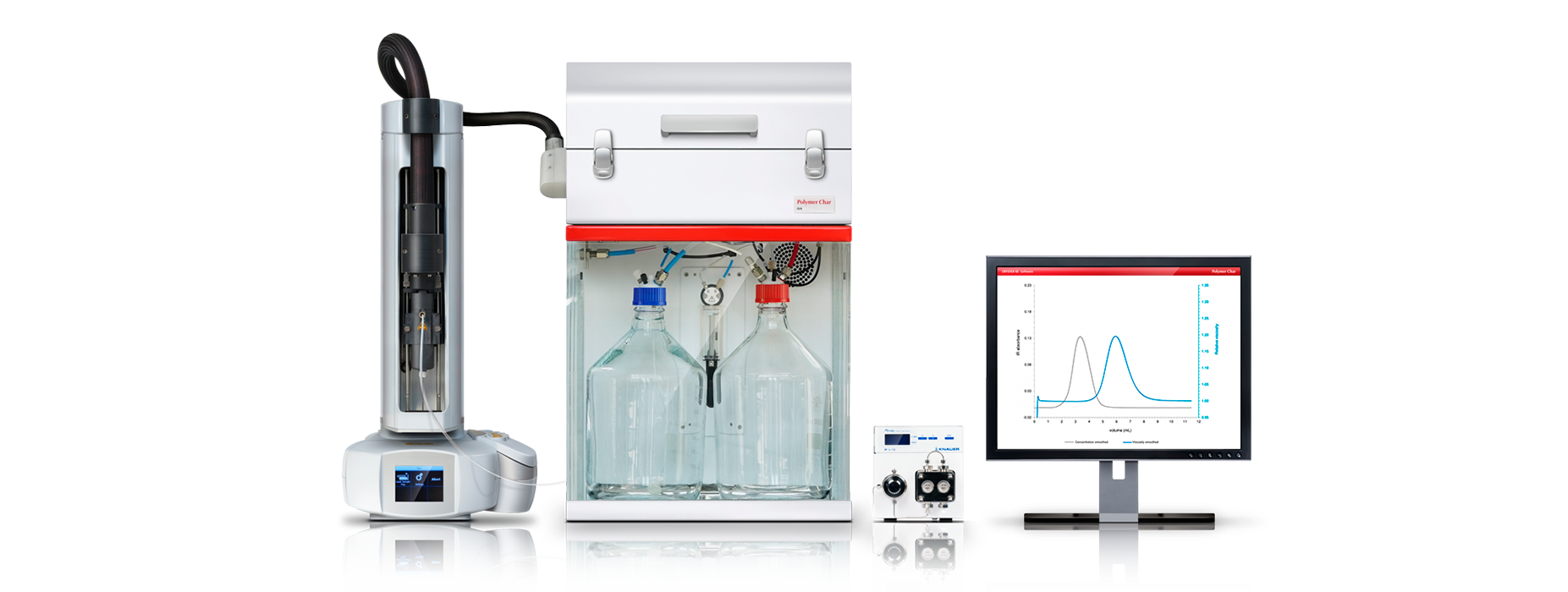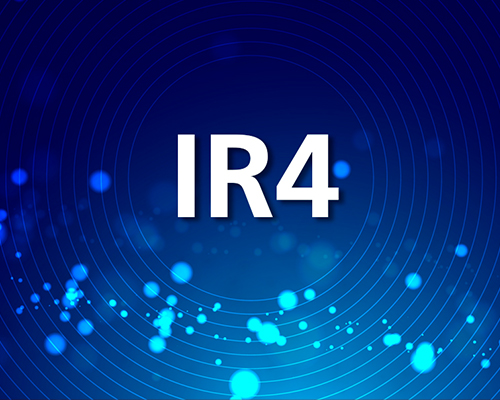IVA for Polyolefins
A reliable and automated instrument to measure the intrinsic viscosity of polyolefins at high temperature.
Recommended for samples of the type Polyethylene and Polypropylene.

A reliable and automated instrument to measure the intrinsic viscosity of polyolefins at high temperature.
Recommended for samples of the type Polyethylene and Polypropylene.

A fully-automated instrument for intrinsic viscosity analysis of polyolefins at high temperature.
The Intrinsic Viscosity Analyzer (IVA) is the response to the market’s need for a reliable and automatic viscosity meter for Intrinsic Viscosity (IV) analysis of polyolefins in solution. The IVA instrument integrates a robust dual-capillary relative viscometer that can analyze a wide range of polymers with IV values ranging from 0.1dL/g to over 40dL/g, even the most challenging polymers such as UHMWPE.
IVA delivers, in a reduced footprint, a robust instrument that is completely automatic and easy to use.
The process is simple, the analyst places the vials with polymer into the autosampler’s room-temperature tray and the instrument takes care of the rest. The autosampler moves the vials into the dissolution oven, fills them with the correct amount of solvent, and dissolves the sample with a gentle shake. The dissolution temperature, shaking intensity, non-oxidative atmosphere with nitrogen, and time are accurately controlled, so the analyst can select the optimum conditions to achieve full dissolution while minimizing thermal degradation.
The careful design of the transfer line that connects the autosampler with the instrument’s main module avoids cold spots, so even the most challenging polymers can be analyzed without plugging issues, providing robust and precise viscosity values over time.
The viscometer’s capillaries and tubing do not require manual washing or rinsing, as this is done by the instrument itself.
The incorporation of an Infrared detector IR4 enhances the capabilities of IVA by accurately quantifying the injected polyolefin’s mass, which results in improved precision and accuracy in the intrinsic viscosity results.
INTRINSIC VISCOSITY METHOD:
The IVA complies with the ASTM D5225 (Standard Test Method for Measuring Solution Viscosity of Polymers with a Differential Viscometer)
IVA is currently in the process of being included in the ISO 1628-1, as an alternative to the current method based on Ubbelohde glass capillaries.
· Optimized for the analysis of polyolefins at high temperature, up to 180ºC
· Full-automation of dissolution and analysis processes. No manual solvent handling
· High-temperature autosampler for dissolution of samples in the same instrument
· Up to 42 samples can be analyzed sequentially without user intervention
· No need for accurate weighing when the optional IR detector is used
· Based on dual capillary relative viscometer
· Self-cleaning design
· Simple to operate and reliable instrument
· High precision achieved by automation
· Analysis of high and ultrahigh molar mass polyolefins
· Low solvent consumption

IR4 is a dual-wavelength infrared detector, which uses the principle of infrared absorption spectroscopy to measure the concentration and composition in polyolefins. When analyzing polymers containing significant C-H content, the IR4 detector can be used to accurate quantify the injected mass, eliminating the need to weigh the sample.

The IVA instrument integrates a robust dual-capillary relative viscometer which measures the relative viscosity of a polymer solution to that of the pure solvent itself and, from this value, the intrinsic viscosity of the polymer is calculated.
IVA is controlled by an intuitive and easy-to-use software that automates the analytical process and provides tools for instrument maintenance and advanced operations.
Two operation modes are available: Operator and Administrator.
In Operator mode, the software allows routine analysis to be performed using a pre-defined method. The only manual tasks required are putting the polymer pellets (or powder) inside the analysis vials and starting the software. The intrinsic viscosity results are automatically generated and stored in a Results Table.
In Administrator mode – apart from the Operator mode functions – the analytical and data processing conditions can be optimized, calibration methods are available, as well as the ability to review and re-process previously analyzed files.
The results from all the analyzed samples are stored in separate files in the computer’s hard disk, and organized in a database for a convenient management of all the historical data. The intrinsic viscosity value, as well as the concentration measured by the infrared detector (if using), is directly provided by the software.
The IVA Software also incorporates a “manual mode”. This manual mode functions as a virtual instrumentation interface that allows the user to perform any action on any hardware element (autosampler, solvent dispenser, valves, etc). Consequently, the user does not need to work manually at high temperature nor handle solvents during maintenance or diagnosis tasks.
To request a demo, please contact us
Read more about One Software
The main purpose of IVA is to analyze the intrinsic viscosity of polyolefins, such as Polyethylene (PE), Polypropylene (PP), that require dissolution and analysis at high temperature.
For simpler applications that require analysis at ambient temperature, please check out IVA Versa.
The IVA has an autosampler that can handle up to 42 vials. The samples are dissolved and analyzed automatically, no supervision required. The total analysis time will depend on the dissolution time and number of injections per vial. Each injection of each vial will last the programmed analysis time, typically 15 minutes. Only the dissolution time of the first sample should be added to this total time, as the dissolution of the following sample will be carried out while the previous sample is being analyzed.
Between 4 and 16mg of sample for preparing a 0.25 to 1mg/mL solution in a 20 mL autosampler vial.
The equipment is compatible with most organic solvents.
The solvent used will depend on the polymer to be analyzed as the polymer has to be in solution for the analysis.
For PE, PP, EP, UHMWPE: decaline, trichlorobenzene, orto-dichlorobenzene.
IVA instrument is specifically designed for high temperature applications up to 180ºC, depending on the solvent and the polymer to be analyzed.
The analysis and dissolution temperature are independent, so different temperatures can be used for each step.
The only manual tasks required are weighing the dry samples, putting them inside disposable glass vials, and placing those vials in the autosampler tray. The rest of the steps are performed by the instrument automatically: filling the vials with solvent, sample dissolution, injection, as well as rinsing the valves and lines.
As the samples are being analyzed, a summary table with the automatic calculations generated by the software is shown on the computer screen.
The user always has the possibility of validating the results generated automatically with the IVA software.
A reporting tool has also been developed to generate Excel reports adapted to each user needs.
The intrinsic viscosity results provided by the IVA instrument are very reliable. We have tested different polymers in various solvents, and all intrinsic viscosity results show good agreement with the traditional methods of reference (ISO 1628-3:2010 f.i.)
You can request a quotation via the Contact Form or by sending us an email to sales@polymerchar.com
Thank you for your interest. If you would like to receive more information or want to request a quotation please complete this form.
This site uses cookies to give you a better browsing experience. If you continue
browsing this site we understand that you accept our use of cookies.
For more information,
please visit our Cookies Policy. You can configure which
cookies you accept by ticking the next options: